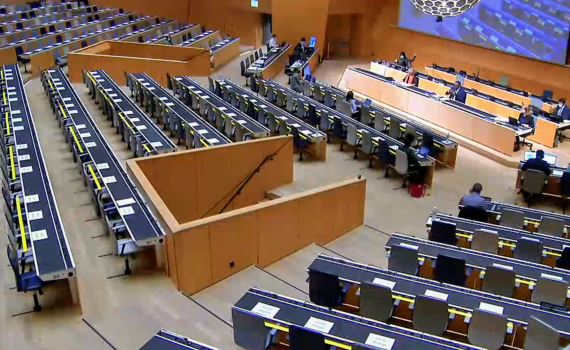

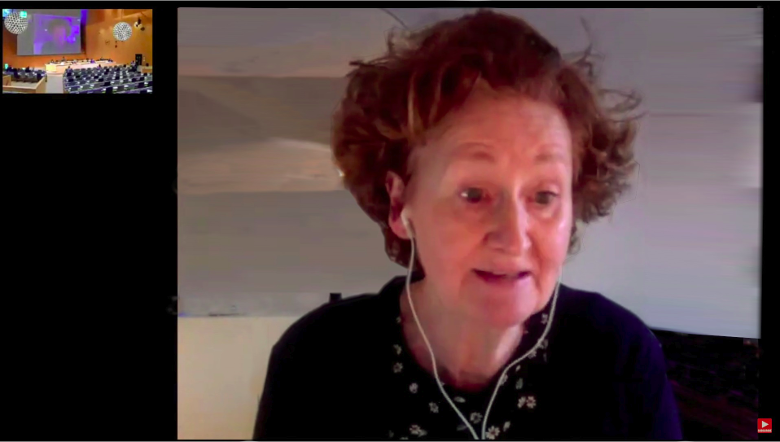
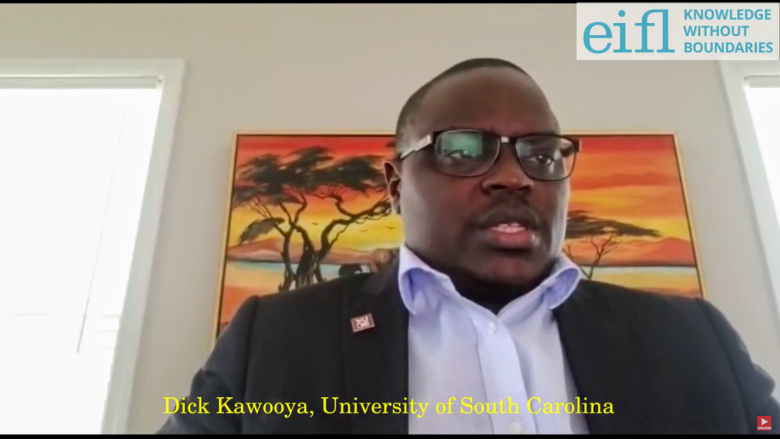
At WIPO’s copyright committee that met for the first time in over a year, EIFL highlighted the need for fair access by libraries to broadcast content, the need for a work plan on digital preservation, and the challenges of public lending right in developing countries
Posted by Teresa Hackett, Copyright and Libraries Programme Manager, December 4, 2020
Teresa Hackett, EIFL’s Copyright and Libraries Programme Manager, reports from the WIPO (World Intellectual Property Organization) copyright committee that met recently in hybrid mode in Geneva
To prevent the spread of COVID-19, WIPO SCCR/40 met in hybrid mode, with physical participation limited to a small number of Geneva-based member state delegates, and everyone else participating remotely.
WIPO’s Standing Committee on Copyright and Related Rights (SCCR/40) recently met for the first time in over a year due to the COVID-19 pandemic. EIFL was represented by Teresa Hackett, EIFL Copyright and Libraries Programme Manager and Dick Kawooya, University of South Carolina, who called for fair access to broadcast content by libraries, adoption of a work plan digital preservation, and highlighted the challenges of public lending right in developing countries.
The meeting took place in hybrid mode, meaning that physical participation was limited to a small number of Geneva-based member state delegates, and everyone else participated remotely over five days, for two and a half hours each day. Due to the unusual circumstances, the SCCR’s new chair, M. Aziz Dieng from Senegal, announced at the start of the session that the meeting would not engage in any negotiations or decision-making but would instead take stock of the committee’s work.
Fair access to broadcast content
WIPO member states are negotiating a treaty that would introduce a new exclusive right for broadcast organizations over the content they broadcast (a bit like giving the postal service a right over the content they deliver by post).
Teresa Hackett, EIFL copyright and Libraries Programme Manager, presenting EIFL's statement on limitations and exceptions during WIPO SCCR/40.
For libraries, a new broadcast right would introduce a new layer of rights to deal with when broadcast content is used for social, educational and public interest purposes, for example, to support educational projects on TV and film, history, or to mark national events such as independence day. The COVID-19 pandemic has highlighted the need for fair access for public interest purposes - broadcasters have played a vital public information role in the pandemic and educational TV has supported remote learning during lockdown, a lifeline in countries with limited access to digital technologies.
The only way to guarantee fair access is to make the exceptions in the draft treaty text (document SCCR/39/7) mandatory, instead of optional. The text should also provide for exceptions that are mandatory in other treaties, such as quotation in the Berne Convention, and the making of accessible format copies in the Marrakesh Treaty. Limitations and exceptions are a recognized part of a properly functioning copyright system, and any new treaty that creates new rights should have equal regard for exceptions and limitations. [Watch EIFL’s statement on broadcasting.]
Limitations and exceptions: start work on digital preservation
The WIPO Secretariat presented its report on four events on limitations and exceptions held in 2019: regional seminars in Singapore, Nairobi and Santo Domingo, and an international conference in Geneva (document SCCR/40/2). The goal of the events was to advance discussion on the issue of limitations and exceptions for libraries and archives, as well as education and research, that have been on the SCCR agenda for more than a decade.
In our statement on the Secretariat’s report, EIFL welcomed the recognition in the report of cultural heritage as an invaluable, and vulnerable, common good. At all four events, there was a high degree of consensus for work by WIPO on preservation of cultural heritage. Experts, government delegates, and observers all recognized the threat posed by natural disasters, fire, and floods to the cultural heritage of many member states, particularly island nations affected by climate change. They also recognized that copyright laws in many countries are a barrier, for example, more than half the countries in Africa do not have a preservation exception.
The COVID-19 pandemic is a reminder of the importance of digital preservation. If material related to the pandemic, such as research data, scientific articles, and public health videos, is not professionally preserved, it won’t exist or it won’t be findable to future scholars and scientists. Countries without clear preservation rights will be left behind with gaps in their national record of responses to the pandemic, or their contributions to finding a treatment, or preserved works may be held by institutions in other countries with better copyright laws.
EIFL asked the SCCR to follow through on the consensus achieved by adopting a work plan on preservation, to include text-based work on a legal instrument, in accordance with the 2012 WIPO Assembly decision that mandates the SCCR to continue discussion towards “an appropriate international legal instrument, in whatever form”. In the meantime, while the SCCR’s work is curtailed due to the pandemic, the Secretariat could retain its expert, Professor Kenneth Crews, to prepare model provisions on preservation to provide countries with timely guidance on this important issue. [Watch EIFL’s statement on limitations and exceptions.]
EIFL also supported the call for a ‘Doha Declaration for Covid’ to promote the flexibilities in the international copyright system so that online activities for education, research and social engagement are not impeded during the pandemic. (The 2001 Doha Declaration on public health clarified flexibilities in the WTO TRIPS Agreement on access to medicines in times of national emergency).
No PLR in developing countries - no tax on library lending
On the last day of SCCR/40, the government of Sierra Leone made a formal proposal for WIPO to undertake a scoping study on Public Lending Right (PLR), with a particular focus on the establishment of a PLR system in developing countries (document SCCR/40/3.REV.2). The proposal was supported by Panama and Malawi.
Dick Kawooya, University of South Carolina, presenting EIFL’s statement on public lending right.
In EIFL’s experience, PLR raises particular challenges in developing countries: in fact in the 1990s, WIPO rejected PLR specifically because of its negative impact on libraries, literacy and development.
Of course, EIFL appreciates the goal behind the proposal that is to support authors. However, payments to authors in the form of grants, scholarships and pensions, as mentioned in the proposal, could all be achieved without establishing a PLR system and without imposing what is in effect a tax on library lending. And if financial supports were made directly to authors, they would be more targeted, more transparent and better value for money because they would cut out the middleman who would take a portion of the proceeds. Another easy mechanism to support authors is to allocate a budget for public libraries to purchase works by local authors. [Watch EIFL’s statement on public lending right.]
Since time ran out for NGOs to make interventions on PLR, library groups recorded statements. Statements from EIFL, IFLA (the International Federation of Library Associations and Institutions) and CFLA (the Canadian Federation of Library Associations) are available here.
Read EIFL’s statements on all the topics at SCCR/40.
WIPO meetings are online here.
Read more about why EIFL is advocating for an international treaty for libraries and archives.
Dịch: Lê Trung Nghĩa
letrungnghia.foss@gmail.com
Ý kiến bạn đọc
Những tin mới hơn
Những tin cũ hơn
Blog này được chuyển đổi từ http://blog.yahoo.com/letrungnghia trên Yahoo Blog sang sử dụng NukeViet sau khi Yahoo Blog đóng cửa tại Việt Nam ngày 17/01/2013.Kể từ ngày 07/02/2013, thông tin trên Blog được cập nhật tiếp tục trở lại với sự hỗ trợ kỹ thuật và đặt chỗ hosting của nhóm phát triển...
 DigComp 3.0: Khung năng lực số châu Âu
DigComp 3.0: Khung năng lực số châu Âu
 Các bài toàn văn trong năm 2025
Các bài toàn văn trong năm 2025
 Các bài trình chiếu trong năm 2025
Các bài trình chiếu trong năm 2025
 Các lớp tập huấn thực hành ‘Khai thác tài nguyên giáo dục mở’ tới hết năm 2025
Các lớp tập huấn thực hành ‘Khai thác tài nguyên giáo dục mở’ tới hết năm 2025
 Tập huấn thực hành ‘Khai thác tài nguyên giáo dục mở’ cho giáo viên phổ thông, bao gồm cả giáo viên tiểu học và mầm non tới hết năm 2025
Tập huấn thực hành ‘Khai thác tài nguyên giáo dục mở’ cho giáo viên phổ thông, bao gồm cả giáo viên tiểu học và mầm non tới hết năm 2025
 Các tài liệu dịch sang tiếng Việt tới hết năm 2025
Các tài liệu dịch sang tiếng Việt tới hết năm 2025
 Loạt bài về AI và AI Nguồn Mở: Công cụ AI; Dự án AI Nguồn Mở; LLM Nguồn Mở; Kỹ thuật lời nhắc;
Loạt bài về AI và AI Nguồn Mở: Công cụ AI; Dự án AI Nguồn Mở; LLM Nguồn Mở; Kỹ thuật lời nhắc;
 Tổng hợp các bài của Nhóm các Nhà cấp vốn Nghiên cứu Mở (ORFG) đã được dịch sang tiếng Việt
Tổng hợp các bài của Nhóm các Nhà cấp vốn Nghiên cứu Mở (ORFG) đã được dịch sang tiếng Việt
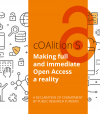 Tổng hợp các bài của Liên minh S (cOAlition S) đã được dịch sang tiếng Việt
Tổng hợp các bài của Liên minh S (cOAlition S) đã được dịch sang tiếng Việt
 Năm Khoa học Mở & Chuyển đổi sang Khoa học Mở - Tổng hợp các bài liên quan
Năm Khoa học Mở & Chuyển đổi sang Khoa học Mở - Tổng hợp các bài liên quan
 Bàn về 'Lợi thế của doanh nghiệp Việt là dữ liệu Việt, bài toán Việt' - bài phát biểu của Bộ trưởng Nguyễn Mạnh Hùng ngày 21/08/2025
Bàn về 'Lợi thế của doanh nghiệp Việt là dữ liệu Việt, bài toán Việt' - bài phát biểu của Bộ trưởng Nguyễn Mạnh Hùng ngày 21/08/2025
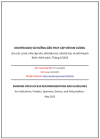 ‘KHUYẾN NGHỊ VÀ HƯỚNG DẪN TRUY CẬP MỞ KIM CƯƠNG cho các cơ sở, nhà cấp vốn, nhà bảo trợ, nhà tài trợ, và nhà hoạch định chính sách’ - bản dịch sang tiếng Việt
‘KHUYẾN NGHỊ VÀ HƯỚNG DẪN TRUY CẬP MỞ KIM CƯƠNG cho các cơ sở, nhà cấp vốn, nhà bảo trợ, nhà tài trợ, và nhà hoạch định chính sách’ - bản dịch sang tiếng Việt
 50 công cụ AI tốt nhất cho năm 2025 (Đã thử và kiểm nghiệm)
50 công cụ AI tốt nhất cho năm 2025 (Đã thử và kiểm nghiệm)
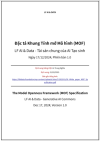 ‘Đặc tả Khung Tính mở Mô hình (MOF)’ của LF AI & Data - Tài sản chung của AI Tạo sinh - bản dịch sang tiếng Việt
‘Đặc tả Khung Tính mở Mô hình (MOF)’ của LF AI & Data - Tài sản chung của AI Tạo sinh - bản dịch sang tiếng Việt
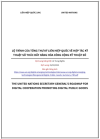 ‘LỘ TRÌNH CỦA TỔNG THƯ KÝ LIÊN HIỆP QUỐC VỀ HỢP TÁC KỸ THUẬT SỐ THÚC ĐẨY HÀNG HÓA CÔNG CỘNG KỸ THUẬT SỐ’ - bản dịch sang tiếng Việt
‘LỘ TRÌNH CỦA TỔNG THƯ KÝ LIÊN HIỆP QUỐC VỀ HỢP TÁC KỸ THUẬT SỐ THÚC ĐẨY HÀNG HÓA CÔNG CỘNG KỸ THUẬT SỐ’ - bản dịch sang tiếng Việt
 AI trong TVET - Một vài gợi ý triển khai trong thực tế
AI trong TVET - Một vài gợi ý triển khai trong thực tế
 Tọa đàm ‘Vai trò của Tài nguyên Giáo dục Mở trong chuyển đổi số giáo dục đại học’ tại Viện Chuyển đổi số và Học liệu - Đại học Huế, ngày 12/09/2025
Tọa đàm ‘Vai trò của Tài nguyên Giáo dục Mở trong chuyển đổi số giáo dục đại học’ tại Viện Chuyển đổi số và Học liệu - Đại học Huế, ngày 12/09/2025
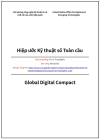 ‘Hiệp ước Kỹ thuật số Toàn cầu’ của Liên hiệp quốc - bản dịch sang tiếng Việt
‘Hiệp ước Kỹ thuật số Toàn cầu’ của Liên hiệp quốc - bản dịch sang tiếng Việt
 12 dự án AI Nguồn Mở hàng đầu để bổ sung vào kho công nghệ của bạn. 11. Hugging Face Transformers
12 dự án AI Nguồn Mở hàng đầu để bổ sung vào kho công nghệ của bạn. 11. Hugging Face Transformers
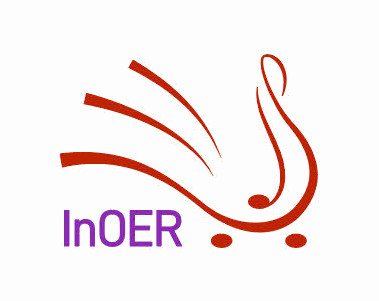 Dự án DIAMAS đưa ra Khuyến nghị và Hướng dẫn Truy cập Mở Kim cương
Dự án DIAMAS đưa ra Khuyến nghị và Hướng dẫn Truy cập Mở Kim cương
 50 công cụ AI tốt nhất cho năm 2025 (Đã thử và kiểm nghiệm) - Trợ lý AI tốt nhất (chatbots)
50 công cụ AI tốt nhất cho năm 2025 (Đã thử và kiểm nghiệm) - Trợ lý AI tốt nhất (chatbots)
 Hướng dẫn kỹ thuật lời nhắc. Kỹ thuật viết lời nhắc. Lời nhắc Tái Hành động (ReAct)
Hướng dẫn kỹ thuật lời nhắc. Kỹ thuật viết lời nhắc. Lời nhắc Tái Hành động (ReAct)
 50 công cụ AI tốt nhất cho năm 2025 (Đã thử và kiểm nghiệm) - Trình tạo nhạc AI tốt nhất
50 công cụ AI tốt nhất cho năm 2025 (Đã thử và kiểm nghiệm) - Trình tạo nhạc AI tốt nhất
 Nâng cao tính mở và khả năng sử dụng của Hàng hóa Công cộng Kỹ thuật số bằng cách chỉ chấp nhận các bộ sưu tập nội dung và bộ dữ liệu hoàn toàn được cấp phép mở
Nâng cao tính mở và khả năng sử dụng của Hàng hóa Công cộng Kỹ thuật số bằng cách chỉ chấp nhận các bộ sưu tập nội dung và bộ dữ liệu hoàn toàn được cấp phép mở
 Vì sao Singapore đang xây dựng hàng hóa công cộng kỹ thuật số
Vì sao Singapore đang xây dựng hàng hóa công cộng kỹ thuật số
 50 công cụ AI tốt nhất cho năm 2025 (Đã thử và kiểm nghiệm) - Công cụ AI quản lý kiến thức tốt nhất
50 công cụ AI tốt nhất cho năm 2025 (Đã thử và kiểm nghiệm) - Công cụ AI quản lý kiến thức tốt nhất
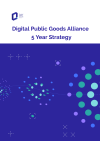 Chiến lược 2023-2028 của DPGA
Chiến lược 2023-2028 của DPGA
 Hướng dẫn nghiên cứu của khoa về ChatGPT và các công cụ AI
Hướng dẫn nghiên cứu của khoa về ChatGPT và các công cụ AI
 Hiểu các giấy phép CC và đào tạo AI: Một tóm tắt về pháp lý
Hiểu các giấy phép CC và đào tạo AI: Một tóm tắt về pháp lý
 Hàng hóa công cộng kỹ thuật số có thể giúp mở khóa tiềm năng lợi ích công cộng của AI như thế nào
Hàng hóa công cộng kỹ thuật số có thể giúp mở khóa tiềm năng lợi ích công cộng của AI như thế nào